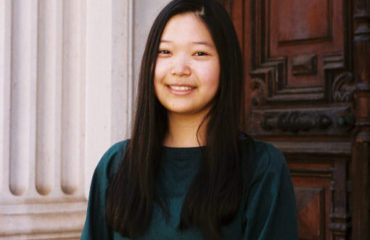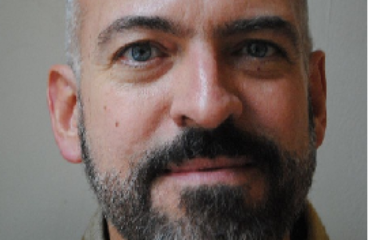INTERVIEW WITH Matthew Olzmann

Matthew Olzmann’s latest collection, Constellation Route, is out now from Alice James. He has published two previous collections, Contradictions in the Design and Mezzanines, and he has received fellowships from Kundiman, the Kresge Arts Foundation and the Bread Loaf Writers’ Conference.
FWR: Can you speak on the genesis and organization of Constellation Route?
MO: I’ve written poems that mimic a letter, or utilize an epistolary or apostrophe approach often before, and at some point I just thought that if I have fun doing that, what would happen if I did that non stop for a while? So that was the genesis; it didn’t necessarily start out as ‘I’m writing a book of these’ but instead wanting to see what direction the writing would go if I kept doing it over and over. How long would it stay interesting for me, this thing that is often a default mode for me? Would it remain interesting or would it evolve? Would I make new discoveries? I think sometimes in writing, there’s the impulse to reinvent the wheel each time you sit down and write, but if something seems interesting to you or something feels productive, you should try to do that again.
I thought [the organization of the book] would be easier than my previous two books because in those books, the subject matter is somewhat disparate, so that challenge was to see how I could get these things to fit together. With [Constellation Route], since they all have a similar approach or they’re about postal terminology, it felt as though there’s already a governing logic for why they belong in the same book.
But then I started having new challenges. For example, when so many poems have the same approach, how do you create variation, how do you change things up? That affected the writing process later, as I tried to write things in new directions. Then [this book] had all the challenges my other books have had. Even though there’s a formal approach that makes [these poems] similar, the subject matter and tone can vary widely. It ended up having all the old challenges and some new ones, just to make it interesting.
FWR: As I was reading through it, I loved the moment where poems came back to a subject or referenced a previous poem (for example, “Letter to the Oldest Living Longleaf Pine in North America” and “Letter to the Person Who Carved His Initials into the Oldest Living Longleaf Pine in North America”). The opening and closing poems to me seemed really set, so I had wondered if you had written “Day Zero” and “Conversion” with the intention of having them as those bookends.
MO: I didn’t write any of those intending for them to be in a specific position; “Day Zero” had a different place in the book, and Jessica Jacobs said I should start with that poem. As I was putting the book together, some of those things were things I was aware of. I wanted to spread them out so there was this echo.
FWR: To build on that idea, I’m struck by how writing the same structure of a poem, an epistolary or an apostrophe, is reminiscent of how an echo can lead to deviation. There’s the sameness, but also beauty in the deviation. It reminds me of how a postal route works– presumably, you’re going through the same route and making the same stops, but you’re seeing them in new lights or in new ways as you move through the seasons or through a place.
MO: The post office, despite my limited knowledge of some aspects of it, ended up having some influence on not only the poems but also the shape of the book and the language. Looking at the glossary of postal terms, wing case, day zero, everything seemed to be like an institution made by a poet.
FWR: In a conversation with Kaveh Akbar, hosted by A Mighty Blaze, you spoke about play in poetry as a spiritual or meditative practice, and how “irreverence requires acknowledgement of something grand”. To what extent do you feel you’re using humor as a bridge to the reader, or even to deflect someone’s guard being up?
MO: I think in our daily lives, we can use humor to attack or criticize, but also to charm and entertain, or to diffuse tension. We can use it to introduce an idea or to present something in an unexpected manner. I think in poems or stories, or perhaps any kind of writing, one of the things that’s useful about humor is that it disrupts the reader’s ability to anticipate to a degree. As a writer, I’m generally interested in humor because it creates a point of contrast. I like poems that have more than one emotion, especially placed next to each other. Sometimes it’s because an emotion next to the other sets off the second, whether that’s moving from certainty to doubt, or anger to something more meditative, from grief to wonder. I’m also just drawn to writing as a reader and as a writer that isn’t presenting human experience in a monotonous way. I feel both terror and wonder when looking out into the world, and I’m trying to find a space where both of those can exist in the writing process.
FWR: The poem “Letter to Matthew Olzmann, Sent Telepathically from a Flock of Pigeons While Surrounding Him on a Park Bench in Detroit, Michigan” comes to mind, and how it moves from the absurd to this greater, more empathetic commentary. As a teacher, I think that humor helps open poems up and make them accessible or an experience to be shared. And that transition, from the human to a more humane tapestry to find oneself in I think works really well in this collection.
MO: I see what you mean about humor being a point of connection. When I think about other artists who I’m drawn to, there’s something about humor that feels, in the audience, engaging or charming. It can feel like I’m being let into something– when you’re both laughing, you feel like you’re in on the joke. It’s hard to imagine who’s reading a poem when you’re writing it. I have some people in mind, sometimes, I’m always going to share what I write with my partner, Vievee, but after that, when the poem goes into the world, I have no idea who’s reading it. I like the idea of it being accessible to some people who aren’t necessarily poetry scholars or writers.
FWR: In the title poem, “Constellation Route”, you write:
…a messenger… gets wildly lost. It’s night.
Lonely. He glances to the sky–
inside that disorder,
he finds one light that makes sense, and that’s enough
to guide him to the next stop.
For me, that was the moment where a lot of the poems clicked, where I felt like I could name the theme that I couldn’t quite put my finger on previously: the idea of community. This fits what we’ve talked about with how humor forms connection, but also the letter form as a way of asserting a community (of friends, of writers). This seemed to come up again and again in your poems, whether “Fourteen Letters to a 52-Hertz Whale” (“Do you ever wonder that because your voice is impossible to hear, maybe no one will make the effort? That you can work really hard and try to be a good person… but then… the waves will just swallow you whole?”) or “Letter Written While Waiting in Line at Comic Con” (“…it’s not/ these costumes that amaze me; it’s always been/ the languages. The way they reach/ for something that can’t be said/ in our tongue.”).One of the things you seem to be reaching at is how we form and maintain community, and then, looking at the United States, how might this idea of community be under threat or at risk of change in ways that might not be particularly kind.
MO: I don’t know if I was thinking of community as one of the primary thematic drivers of when I was making the book, but I started to become aware of that later. One of the reasons I might not have been aware of it in the writing is that I tend to write poems one-at-a-time, without necessarily thinking of how they relate to one another. I write the poems and assemble books later.
But when I started putting Constellation Route together, one of the things I was thinking about was how to make things feel communal. This was part of the reason for including letters with other people in them (such as “Letter to Matthew Olzmann from Ross White, Re: The Tardigrade”) to give the sense that there were more people involved than one version of Matthew.
One of the questions I was asked recently is if the speaker in these poems, excluding those obviously persona, is me. Are the poems autobiographical? While I think it would be hard for all of them to be me, I’m sure all of them contain aspects of me or some aspect of my world view. Oliver de La Paz said something about his own poems about autobiography that really resonated with me, the idea that in an autobiographical poem, the speaker resembles you the way John Malkovich resembles John Malkovich in Being John Malkovich. I might be taking this quote out of context, but I think the speaker in any of my poems is a performance of the self. It might represent the self but it’s a performance or an aspect of the self, and there can be many of those.
You mention the conversation with A Mighty Blaze and Kaveh [Akbar], and before that, he and I were talking about how the book we haven’t written, the one that’s still in your head, is always perfect, or has the potential to be. Before you’ve made it into an object, it’s this thing that exists in the realm in perfect speculation. Most of the poems, once I tried to write them, it was a pretty messy process. Messy, but some of the fun is making discoveries. A lot of the poems, I might have a line or a vague idea, but I don’t necessarily sit down with a thoroughly mapped out route toward a destination in mind.
I like writing for the process of writing. I like the process of being there and working. There’s a point when I’m working on a poem that I’m imagining it as a point of connection. I imagine how someone might read it, and then it becomes a moment where I’m reaching for a point of contact. Rather than withdrawing from the world, it feels like working on a way to venture out and make contact with people.
FWR: Thinking of connection, or perhaps the perfect poem, are there poems that you love to teach, that do what you’re reaching towards?
MO: It’s constantly changing. It’s a list I’m constantly adding to. So many poems that I love to teach and some of the old standbys: “Iskandariya” by Brigit Pegeen Kelly; “It Is Maybe Time to Admit That Michael Jordan Definitely Pushed Off” by Hanif Abdurraqib; “Wishes for Sons”, by Lucille Clifton, or “Sorrows” or “note, passed to superman”– I remember the first time I read her series of notes to Clark Kent, I remember thinking, “you can do that? You can write notes to these people?”; Rilke’s “The Archaic Torso of Apollo”; “Brokeheart: just like that”, by Patrick Rosal or “Guitar”; “Ode to the Maggot” by Yusuf Komunyaaka; Campbell McGrath’s “My Music”; Cathy Linh Che’s “Poem for Ferguson”; most of Szymborska’s poems. I like talking about her poems “True Love” and “Pi”, “Notes From a Nonexistent Himalayan Expedition”, “A Large Number”, “The End and the Beginning”– I could go on and on.







